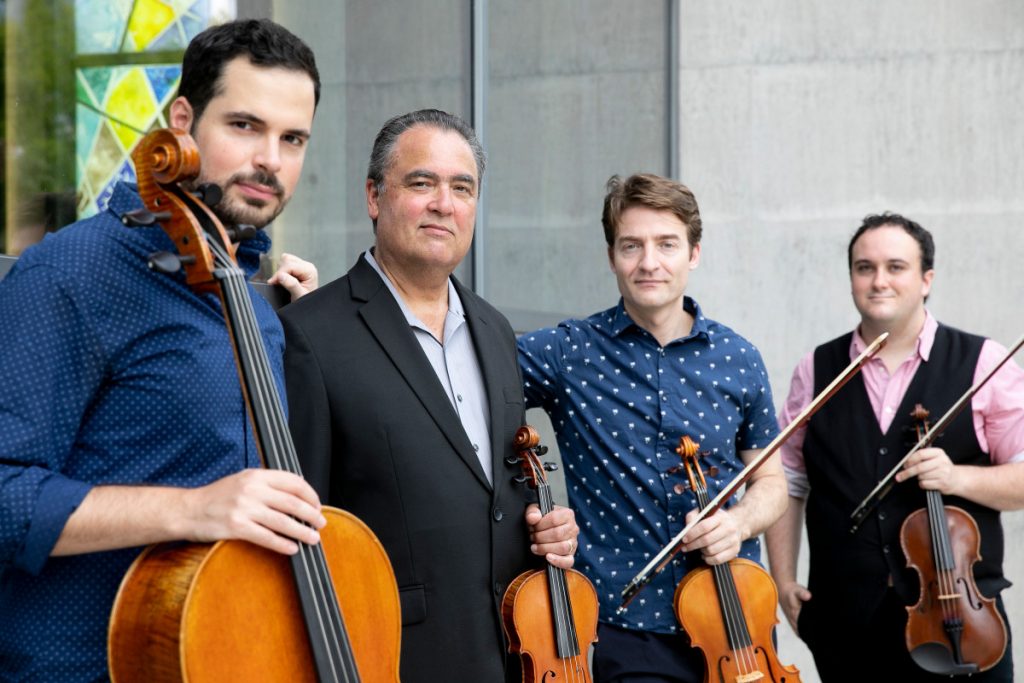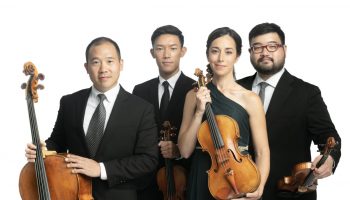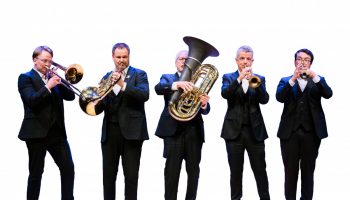
What do you do when a little voice whispers in your ear to play the violin? You listen to it. Especially when that voice belongs to your mom.
David Balakrishnan has been playing the violin since the age of 9, at his mother’s encouragement. Since then, his style has evolved and, in 1985, he became one of the founding members of the Turtle Island String Quartet. Now, the founder and composer-in-residence Balakrishnan and the rest of the quartet — cellist Naseem Alatrash, violinist Gabriel Terracciano, and violist Benjamin Von Gutzeitwill — perform at 4:15 p.m. today in Elizabeth S. Lenna Hall for the Chautauqua Chamber Music Guest Artist Series with a program that, at its core, takes a stylistically integrated, cross-genre approach.
Balakrishnan has been preparing for this program his entire life. Today, the quartet will perform his “Little Mouse Jumps,” “Island Prayers,” “Groove in the Louvre,” “Darkness Dreaming” and “The Second Wave.”
This afternoon’s recital also includes Rhiannon Giddens’ “Pompey Ran Away”; Jerod Impichchaachaacha’ Tate’s “Little Loksi”; and Terence Blanchard’s “Turtle Trajectory.”
Tate is a Chickasaw composer, and the work is deeply informed by his Southeastern American Indian melodies, and it is a favorite story of his son, Heloha (thunder).
Giddens, a frequent Chautauqua program guest, recently received a Pulitzer Prize for her opera Omar; her work centers on overlooked people and forgotten or erased musical origins. “Pompey Ran Away” is a snippet of sound from the late 1800s with Pompey featured as a fiddler — many self-emancipated enslaved people need to have a highly prized skill in order to provide for themselves.
Blanchard is a trumpet player and first collaborated with Turtle Island in 2021 for his album Absence. His piece points to the “rebirth” of the group, Balakrishnan said; Blanchard has been able to hear all that makes the quartet unique and has become a vital influence for the group.
Balakrishnan’s “Island Prayers” is a personal, three-part piece that investigates the process of healing. Movement one, Dialog, is tumultuous expression; movement two, Atonement, goes deeper into the core of pain; and movement three, Redemption, is celebration through new understanding.
“For me, (the last movement of ‘Island Prayers’) is related to the history of having this great name that fits us so well, but that could be seen as, unbeknownst to us, building on a painful aspect of cultural appropriation,” Balakrishnan said.
The four original members of Turtle Island came together in 1985 and focused predominantly on jazz arrangements. Their name is based on a book of poems by Gary Snyder that expressed Snyder’s vision for humans to live in harmony with the earth and all its creatures. “Turtle Island” is also a term used by some Indigenous peoples to refer to the continent; it stems from various Indigenous creation stories which describe the landmass as being formed on the back of a giant turtle. Part of what “Island Prayers” reckons with is going back to the roots of the group’s conception in “honor of the name,” Balakrishnan said.
“A part of being a musician,” said Balakrishnan, “is digging areas of your psyche.” The audience understands the human aspect of having flaws and letting them be seen — “that makes music what it is, so often people respond to that aspect.”
With such a cross-genre path, attaining a level of indisputable expertise is near impossible, but Balakrishnan found “that drive becomes a trap because then you’re stuck in that identity.” He didn’t plan that path, but feels grateful to have so many multi-faceted genres in his repertoire.
Since starting violin lessons at age 9, thanks to that little voice of his mother in his ear, around junior high Balakrishnan started playing rock’n’roll guitar. He combined that style with his violin playing in a way that really got the girls’ attention; he also started developing a deeper understanding of music.
His style as he got older was influenced by Jerry Goodman, a violinist known for playing electric violin in a jazz fusion ensemble. Playing classical music “didn’t really appeal” to Balakrishnan; he craved the creative aspect of composing and improvisation, which is what he focused on for his time at the University of California — playing rock‘n’roll with jazz fusion.
From there he got into bluegrass music, and rediscovered his love for Indian classical music, as he was influenced growing up with a father from India. Unsure how to bring together all of these interests, Balakrishnan earned his master’s degree in composition; after that, he merged the four styles in a compositional way and played each instrumental part himself, dubbing them on a tape deck.
“There’s such a wide palette, so you have to construct music that says something with congruence to be understood, as opposed to a collage of competing styles that don’t have any connections to each other,” Balakrishnan said.
Musicians of Turtle Island Quartet have come and gone over the years; Balakrishnan sees it as a “restless soul kind of thing.” His involvement always kept a throughline: “I became more and more aware that I needed to find ways to embrace these different personalities and feature them right to let them blossom within the music that I’m writing, and then leave space for that to happen.”
As for the 2024 lineup of the Turtle Island Quartet, it is a “complete joy and love to play with these players,” Balakrishnan said. Having the opportunity to return to the Lenna Hall stage is exciting because “if you grew up as an artist, you’re going to want to play at (Chautauqua) anytime you can.”




